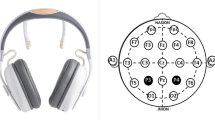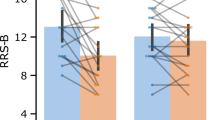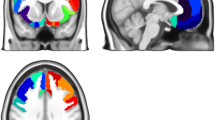Abstract
EEG neurofeedback (NFB) is a brain-computer interface (BCI) approach used to shape brain oscillations by means of real-time feedback from the electroencephalogram (EEG), which is known to reflect neural activity across cortical networks. Although NFB is being evaluated as a novel tool for treating brain disorders, evidence is scarce on the mechanism of its impact on brain function. In this study with 34 healthy participants, we examined whether, during the performance of an attentional auditory oddball task, the functional connectivity strength of distinct fMRI networks would be plastically altered after a 30-min NFB session of alpha-band reduction (n=17) versus a sham-feedback condition (n=17). Our results reveal that compared to sham, NFB induced a specific increase of functional connectivity within the alertness/salience network (dorsal anterior and mid cingulate), which was detectable 30 minutes after termination of training. Crucially, these effects were significantly correlated with reduced mind-wandering 'on-task' and were coupled to NFB-mediated resting state reductions in the alpha-band (8-12 Hz). No such relationships were evident for the sham condition. Although group default-mode network (DMN) connectivity was not significantly altered following NFB, we observed a positive association between modulations of resting alpha amplitude and precuneal connectivity, both correlating positively with frequency of mind-wandering. Our findings demonstrate a temporally direct, plastic impact of NFB on large-scale brain functional networks, and provide promising neurobehavioral evidence supporting its use as a noninvasive tool to modulate brain function in health and disease.
Similar content being viewed by others
Article PDF
Author information
Authors and Affiliations
Rights and permissions
About this article
Cite this article
Lanius, R., Ros, T., Theberge, J. et al. Mind over chatter: plastic up-regulation of the fMRI alertness network by EEG neurofeedback. Nat Prec (2012). https://doi.org/10.1038/npre.2012.7060.1
Received:
Accepted:
Published:
DOI: https://doi.org/10.1038/npre.2012.7060.1



